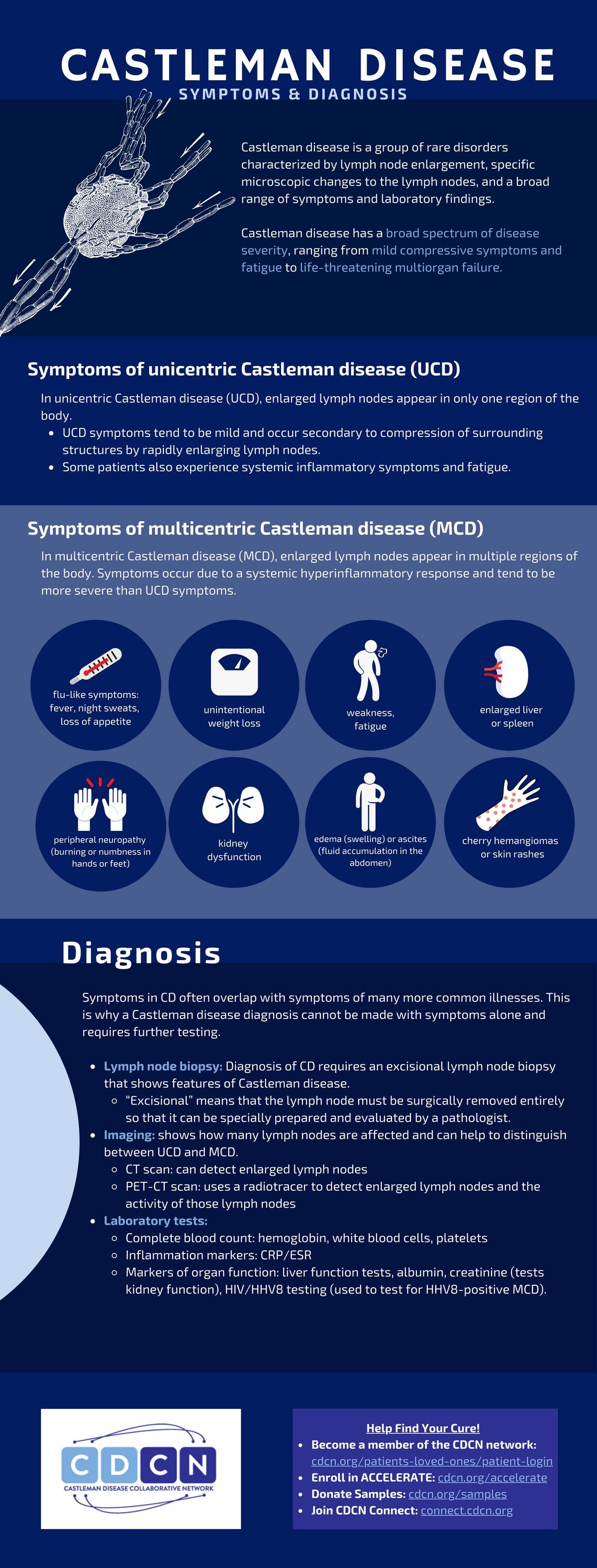
Contents
- 1 Castleman Disease
- 1.0.1 Signs and Symptoms of Castleman Disease
- 1.0.2 Causes of Castleman Disease
- 1.0.3 Inheritance of Castleman Disease
- 1.0.4 Types of Castleman Disease
- 1.0.5 Stages of Castleman Disease
- 1.0.6 Prevalence of Castleman Disease
- 1.0.7 Diagnosing Castleman Disease
- 1.0.8 Treating Castleman Disease
- 1.0.9 Medications for Castleman Disease
- 1.0.10 Surgery for Castleman Disease
- 1.0.11 Specialists for Castleman Disease
- 1.0.12 Key Questions to Ask the Doctor
- 1.0.13 Life Expectancy and Prognosis
Castleman Disease
Castleman disease is a rare disease of lymph nodes and similar tissues. It is a group of lymphoproliferative disorders, involving abnormal growth of lymphatic tissue. Lymphatic tissue consists of different types of cells, including lymphocytes, which are white blood cells responsible for the immune response. Lymphatic tissue is found in lymph nodes, tonsils, thymus, spleen, bone marrow, and gastrointestinal tract.
Castleman disease is not cancer, although it is characterized by abnormal growth of lymphoid tissue, which is also seen in lymphoma. It is also referred to as giant lymph node hyperplasia and angiofollicular lymph node hyperplasia (AFH).
One type of Castleman disease, called multicentric Castleman disease, behaves similarly to lymphoma and can have serious health risks.
Signs and Symptoms of Castleman Disease
There are no predictable signs and symptoms for Castleman disease. Some individuals may be asymptomatic, while others may experience various symptoms.
Castleman disease has two forms: unicentric and multicentric.
Unicentric Castleman disease symptoms and signs:
- Localized with mild or no symptoms
- Enlargement of lymph nodes in one area of the body
- More common in younger individuals
Multicentric Castleman symptoms and signs:
- Widespread enlargement of lymph nodes
- Other symptoms may include fever, loss of appetite, night sweats, weight loss, weakness, fatigue, shortness of breath, cough, numbness of extremities, swollen legs, rash or skin changes, nausea, and vomiting.
Causes of Castleman Disease
Castleman disease occurs due to abnormal growth of lymphocytes. The exact reasons for this abnormal growth are not well understood. Elevated levels of interleukin-6 (IL-6), a chemical associated with the immune response, are often found in people with multicentric Castleman disease. Human herpesvirus-8 (HHV-8), also known as Kaposi sarcoma herpesvirus (KSHV), is found in the lymph node cells of some individuals with multicentric Castleman disease, especially those who are HIV positive. The relationship between the viral infection and the condition is not fully understood.
Inheritance of Castleman Disease
Castleman disease is not considered to be an inherited condition.
Types of Castleman Disease
The two types of Castleman disease are unicentric and multicentric Castleman disease.
Stages of Castleman Disease
Castleman disease does not have a formal staging system, as it is not a cancer. The two types refer to the extent of the disease in the body.
Prevalence of Castleman Disease
Castleman disease is rare, and its frequency in the population is unknown.
QUESTION
Diagnosing Castleman Disease
Castleman disease is diagnosed through a tissue sampling (biopsy) of an affected lymph node. The tissue sample is examined by a pathologist specialized in diagnosing diseases from tissue samples. Additional tests may also be done on the tissue sample. Blood tests that evaluate immune function may also be performed.
Treating Castleman Disease
Treatment for Castleman disease may involve surgery to remove affected lymph nodes, medications to reduce the abnormal immune response, or radiation therapy to destroy areas of affected lymph nodes.
Medications for Castleman Disease
Medications used to treat Castleman disease include corticosteroid drugs, chemotherapy drugs, siltuximab (Sylvant), rituximab (Rituxan), and tocilizumab (Actemra).
Surgery for Castleman Disease
Surgical removal of affected lymph nodes is a helpful treatment for unicentric Castleman disease. Surgery may also be used in multicentric Castleman disease to control symptoms.
Specialists for Castleman Disease
A multidisciplinary team of specialists, including hematologist-oncologists, radiation therapy specialists, surgeons, and infectious disease specialists for HIV-associated Castleman disease, may be involved in the care of individuals with Castleman disease.
Key Questions to Ask the Doctor
- What type of Castleman disease do I have?
- How was the diagnosis established? Should I seek a second opinion?
- What additional tests do I need?
- Do you have experience treating Castleman disease?
- What are the treatment options? What do you recommend?
- What are the side effects of treatment?
- What is the likelihood of successful treatment?
- What is the prognosis?
- What is the follow-up care required after treatment?
- Am I eligible for any clinical trials or new treatments?
Life Expectancy and Prognosis
The outlook for individuals with Castleman disease is challenging to determine due to its rarity and different forms. Survival rates vary depending on factors such as HIV infection and characteristics of lymph nodes. Current survival statistics are based on a small number of past patients, and treatments are continually improving.


